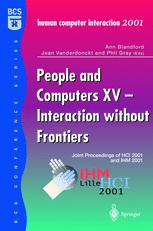

Most ebook files are in PDF format, so you can easily read them using various software such as Foxit Reader or directly on the Google Chrome browser.
Some ebook files are released by publishers in other formats such as .awz, .mobi, .epub, .fb2, etc. You may need to install specific software to read these formats on mobile/PC, such as Calibre.
Please read the tutorial at this link: https://ebookbell.com/faq
We offer FREE conversion to the popular formats you request; however, this may take some time. Therefore, right after payment, please email us, and we will try to provide the service as quickly as possible.
For some exceptional file formats or broken links (if any), please refrain from opening any disputes. Instead, email us first, and we will try to assist within a maximum of 6 hours.
EbookBell Team

5.0
80 reviewsIn 2001 AFIHM and the British HCI Group combined their annual conferences, bringing together the best features of each organisation's separate conference series, and providing a special opportunity for the French- and English-speaking HCI communities to interact.
This volume contains the full papers presented at IHM-HCI 2001, the 15th annual conference of the British HCI group, a specialist group of the British Computer Society and the 14th annual conference of the Association Francophone d'interaction Homme-Machine, an independent association for any French-speaking person who is interested in Human-Computer Interaction.
Human-Computer Interaction is a discipline well-suited to such a multi-linguistic and multi-cultural conference since it brings together researchers and practitioners from a variety of disciplines with very different ways of thinking and working. As a community we are already used to tackling the challenges of working across such boundaries, dealing with the problems and taking advantage of the richness of the resulting insights: interaction without frontiers.
The papers presented in this volume cover all the main areas of HCI research, but also focus on considering the challenges of new applications addressing the following themes:
- Enriching HCI by crossing national, linguistic and cultural boundaries;
- Achieving greater co-operation between disciplines to deliver usable, useful and exciting design solutions;
- Benefiting from experience gained in other application areas;
- Transcending interaction constraints through the use of novel technologies;
- Supporting mobile users.